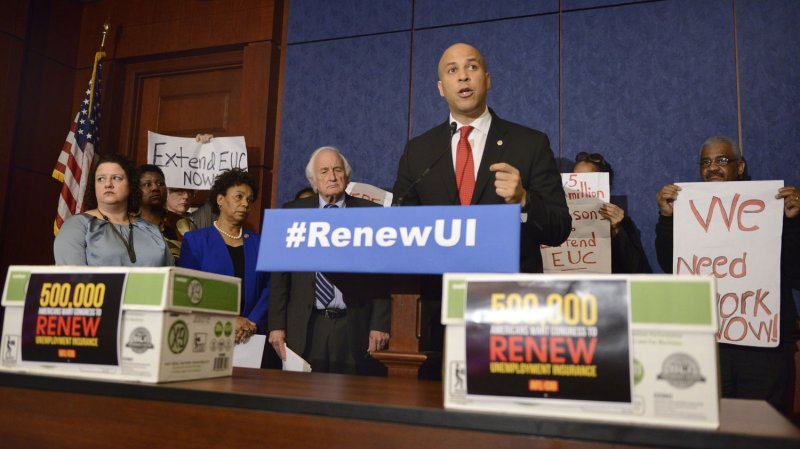US Sen. Cory Booker (D-NJ) makes remarks at a press briefing to rally support for Congress to renew unemployment insurance benefits, which earlier failed to pass Republican opposition, at the US Capitol, January 16, 2014, in Washington, DC. The boxes in the foreground hold petitions to be delivered to Congressional leaders as labor leaders hold signs to support jobless Americans. UPI/Mike Theiler |
License Photo
Could it be? An actual deal in the works to reinstate the extended unemployment benefits that expired just after Christmas?
More than 2 million long-term unemployed have lost their benefits since Dec. 28 -- 1.2 million immediately and 72,000 a week since. With more than 4 million people who have been looking for jobs for more than six months, that's a lot of misery and fear, even with the job market picking up marginally.
A bi-partisan panel led by Sens. Jack Reed, D-R.I., and Dean Heller, R-Nev., late last week issued a statement saying they had come up with a deal to reinstate the benefits -- and pay for them, an issue close to the Tea Party's heart.
The deal is for five months and already has lined up an impressive list of sponsors: Sens. Susan Collins, R-Maine, Rob Portman, R-Ohio, Lisa Murkowski, R-Alaska, Mark Kirk, R-Ill., Jeff Merkley, D-Ore., Cory Booker, D-N.J., Sherrod Brown, D-Ohio, and Dick Durbin, D-Ill.
The benefits would be retroactive to Dec. 28 but those making $1 million or more last year are excluded, about 0.3 percent of all filers.
"There are a lot of good people looking for work and I am pleased we're finally able to reach a strong, bipartisan consensus to get them some help," Reed said in a press release announcing the deal. "Restoring this much needed economic lifeline will help job seekers, boost our economy, and provide a little certainty to families, businesses, and the markets that Congress is capable of coming together to do the right thing."
Reed noted there's still a way to go before "this ... bi-partisan breakthrough" is adopted, namely the 60-vote threshold needed to bring the measure to the Senate floor.
Heller said the time taken to work out the deal has "been extremely difficult" for those who lost their benefits "unsure of how to pay the bills or feed their families."
The measure would pay for the benefits through "pension smoothing" provisions (which have to do with calculating interest rates) from the 2012 highway bill that had been set to begin expiring this year, and extending customs user fees through 2024. The bill also has an offset that would give single-employer pension plans the option of prepaying their flat rate premiums to the Pension Benefit Guaranty Corp.
The White House lauded the measure.
"It's the right thing to do for our economy," the White House said in a statement. "The president urges the Senate to pass the bill and for the House to do the same so that he can sign it into law."
The National Employment Law Project also hailed the agreement.
"We're pleased that a filibuster-proof super-majority in the Senate has at long last found a way to resolve their differences and reach agreement on a temporary, paid-for reauthorization of the federal Emergency Unemployment Compensation program," NELP Executive Director Christine Owens said.
"This agreement is not perfect; we would prefer a longer-term renewal, to avoid refighting this battle in the early summer. But if enacted promptly by the Senate and the House, the measure will restore benefits, retroactively, to more than 2 million long-term unemployed workers who have been denied this crucial support during the harshest winter the nation has experienced in years.
"For the sake of those unemployed workers and their families, we urge Congress not to fail them again."
But the job market remains weak. The February unemployment rate was 6.7 percent with the number of long-term unemployed up 203,000. Only 175,000 jobs were created, better than in December and January, but far short of the 400,000 monthly total University of Maryland economist Peter Morici says are needed to bolster economic growth.
"I have never drawn unemployment," Pam Gibson, 45, of South Point, Ohio, wrote to NELP. "And now, the first time I need it, it has been cut off. Everything is behind. My house is in foreclosure. The car payment is behind. I don't know what we are going to do. My 14-year-old daughter, my niece and her 3-year-old son depend on me -- but right now I can't support any of us."
Democrats on the House Ways and Means Committee have estimated the benefits expiration cost the economy more than $3 billion.
"The loss of long-term unemployment benefits is weighing down our economy at a critical point in the economic recovery, threatening to inflict long-term damage," ranking Democrat Sander Levin of Michigan said. "Long-term unemployment remains an enormous challenge for millions of Americans and our overall economy, which is exactly why Republicans should join with Democrats to renew this important program."















